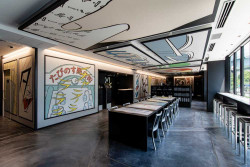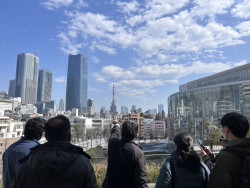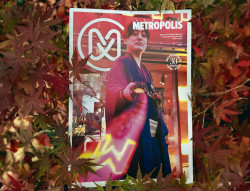
Originally published on metropolis.co.jp on May 2011
EXTREME MEASURES

Phil Couzens
- A Maritime Self-Defense Force member whipped out his tool in a Yokohama video shop in a successful bid to get arrested for exposing himself in public. He was not keen on being sent to Iwate to retrieve bodies killed by the March 11 tsunami.
- A Japanese fashion blogger/medical student “Tokyo Panda,” extremely popular on Chinese online shopping site Taobao, is doing her part for tsunami victims by posting photos of herself in various outfits online and then selling the clothes to raise money for charity.
- Tokyo Disneyland and DisneySea are “under pressure to reduce electric power consumption in anticipation of a power shortage this summer.” The theme parks reportedly use 10 times more power than the Tokyo Dome.
- A fundraising effort organized by Tokyoite Gary Bremermann raised ¥100 for every beer sold with the money going to help kids in Tohoku.
- Meanwhile, a new internet phenomenon known as “slacktivism” has sprung up in the wake of March 11, gaining popularity in Japan. Combining slacker and activism, the term means “to casually engage in social activism at little cost or effort … leisurely philanthropic activities.”
SCHLEP-CO
- More than a month after the crippling of Fukushima nuclear power plant, it came to light that the president of a Japanese construction company offered the use of two large German-made concrete pumps to spray cooling water into the reactors shortly after the wave hit. His offer was apparently ignored by plant operator TEPCO, who later—you guessed it—brought in similar concrete pumps from Germany to do just that.
- Meanwhile, a “high-ranking Japanese government official” admitted that the ineffectual water drop carried out by SDF helicopters on the Fukushima nuclear plant six days after the quake was meant primarily to “show the world how serious Japan was in dealing with the crisis.”
- It was reported that under-fire TEPCO president Masataka Shimizu tried to take an Air Self-Defense Force plane on March 11 to return to the company’s Tokyo HQ from a business trip. The aircraft, however, returned to its base in Aichi Prefecture shortly after takeoff to be used for rescue activities.
- Adding injury to insult, an 11-year-old elementary school student was kicked in the stomach in a bullying incident at a school in Niigata after he had been evacuated from Fukushima Prefecture.
WHAT A DIFFERENCE 70 YEARS MAKES
- Japan and Germany have adopted a resolution saying they “share the same basic values of freedom, democracy and respect for human rights” and will “work together for peace and prosperity throughout the world.”
- The Supreme Court rejected a lawsuit brought against Nobel Prize-winning author Kenzaburo Oe, who claimed in a 1970 book that the Japanese army ordered Okinawans to commit group suicide. The court recognized the army’s “deep involvement” in the suicides.
- It was reported that the Diet is likely to pass a resolution authorizing the “return of 1,205 volumes of Korean historical texts looted during Japan’s colonial rule.”
- Norio Ohga, the former president and chairman of Sony, died of natural causes in Tokyo at the age of 81. Ohga was instrumental in developing the compact disc and is credited with spurring Sony’s drive into video games and music.
- Yahoo Japan reported that, for the 14th consecutive year, it has increased its revenue and operating profit in fiscal 2010.
- Officials in Okinawa have discovered that about 20 percent of locally grown papayas are using a type of genetically modified seed “that has yet to be approved under an international treaty.”
- Japan Tobacco said it took its biggest-ever hit in sales in fiscal 2010, with business down 11.3 percent from the year before. Still, the company did manage to move 134.6 billion cigarettes.
- Panasonic announced it would unveil a lithium-ion battery factory in the eastern Chinese province of Jiangsu next year.
- In response to a drop in demand for flat-screen TVs, Sharp will start using one of its LCD factories in Mie Prefecture to manufacture smaller screens for mobile devices.
- Discussing plans for its magnetic-levitation bullet train line, JR Tokai said it hopes “to build a mag-lev station in every prefecture.”
- During an official state visit, Australian Prime Minister Julia Gillard cemented a deal with Japanese PM Naoto Kan to hold minister-level talks on security issues “as early as this autumn.”
- A group of mystery men doled out some ¥30 million in cash in envelopes at several shelters and evacuation sites in Miyagi Prefecture from April 20-23. The men “claimed to belong to organizations in western Japan.”
IF WE KNEW NOW WHAT THEY KNEW THEN…
- A Geospatial Information Authority of Japan map of the Sendai tsunami flooding, analyzed by a Tohoku University history professor, shows the water stopped just short of the Edo-era Oshu Kaido and Hama Kaido roads—which were built in an area that gets a major tsunami every 400-500 years. Coincidence? We think not.
- Oops. The International Herald Tribune issued an apology for running a cartoon that showed Snow White—carrying a newspaper with the headline “Japan nuclear radiation”—asking if a proffered apple came from Japan.
- On a more positive note, Japan aired a message on CNN thanking the US for all its support after March 11.
- Some 45 people at a Fukushima hospital died “while or after being evacuated” after the catastrophe. The government is investigating why 90 patients were temporarily left behind at Futaba Hospital in Okuma after the disaster.
- Unlike their flyjin counterparts, the Japanese have stuck around after the quake—the number of travelers taking part in package tours plunged 21.3 percent in March compared to a year ago.
- Itochu and Sumitomo have partnered with Google to invest in an Oregon wind farm to cost a total of $2 billion.
- Toyota has announced it will start providing auto loans to car-buyers in India. The service is already available in 30 other countries.
- A cop in Niigata was busted for stealing ¥400,000 from coworkers to cover gambling debts. He also stole some of their notebooks in the hopes of finding “material he could use to harass” them.
- A sumo stablemaster known as Onoe was arrested for drunk driving after falling asleep behind the wheel of his car at a traffic light in Takanawa.
- A freshwater fish called a sculpin, thought to have disappeared from a river in Iwate Prefecture long ago, was found in a pond in Miyako after the March 11 tsunami.
I DID
- Two Japanese employees of a food-processing machine company, in North Korea on business, were being held on suspicion of drug-smuggling. The North Koreans want big dough to let ’em go.
- The publisher of Tokyo entertainment info magazine Pia will stop putting out the publication in July. Started in 1972, the mag “thrived and led Japan’s youth culture in the 1970s and 1980s.”
- Employees at a Miyagi seafood processing company “united to save a prized fish sauce they had been continually making for around 20 years” after the tsunami of March 11. “That sauce is invaluable … as long as we have it, we can maintain our products’ taste,” said the president of Saikichi Shoten.
- Former Livedoor head honcho Takafumi Horie was to resume serving his 30-month prison sentence for accounting fraud after the Supreme Court rejected his appeal.
- Horie may have some company. A former Aozora Bank official was also sentenced to 30 months in prison and fined “for perpetrating insider trading in shares of five listed firms.”
- Call it a sign of the times: former Social Democratic Party legislator Nobuto Hosaka claimed the Setagaya Ward mayor’s race after running on an anti-nuclear platform.
Compiled from reports by Japan Today, The Asahi Shimbun, Jiji, The Daily Yomiuri, The Japan Times, Mainichi Daily News, The Tokyo Reporter, AP, AFP, Reuters and Kyodo.







